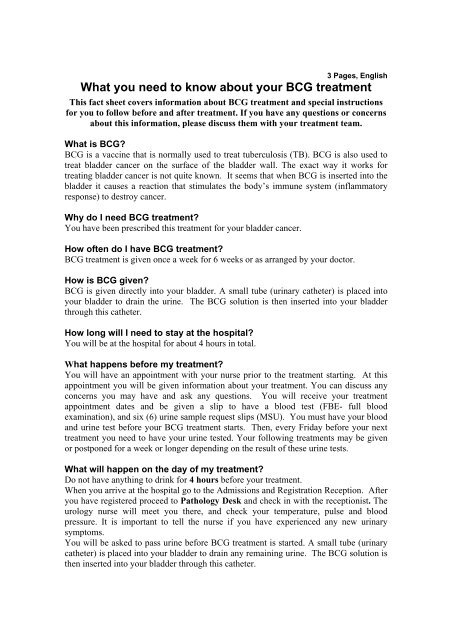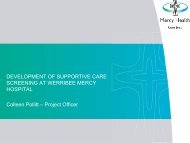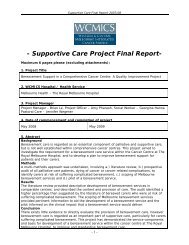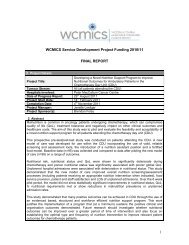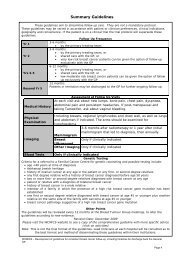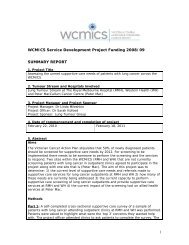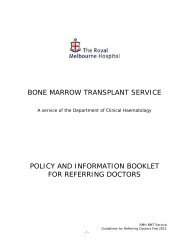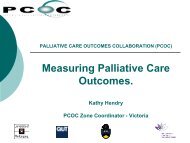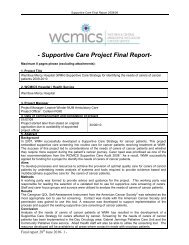What you need to know about your BCG treatment - WCMICS
What you need to know about your BCG treatment - WCMICS
What you need to know about your BCG treatment - WCMICS
You also want an ePaper? Increase the reach of your titles
YUMPU automatically turns print PDFs into web optimized ePapers that Google loves.
3 Pages, English<br />
<strong>What</strong> <strong>you</strong> <strong>need</strong> <strong>to</strong> <strong>know</strong> <strong>about</strong> <strong>you</strong>r <strong>BCG</strong> <strong>treatment</strong><br />
This fact sheet covers information <strong>about</strong> <strong>BCG</strong> <strong>treatment</strong> and special instructions<br />
for <strong>you</strong> <strong>to</strong> follow before and after <strong>treatment</strong>. If <strong>you</strong> have any questions or concerns<br />
<strong>about</strong> this information, please discuss them with <strong>you</strong>r <strong>treatment</strong> team.<br />
<strong>What</strong> is <strong>BCG</strong>?<br />
<strong>BCG</strong> is a vaccine that is normally used <strong>to</strong> treat tuberculosis (TB). <strong>BCG</strong> is also used <strong>to</strong><br />
treat bladder cancer on the surface of the bladder wall. The exact way it works for<br />
treating bladder cancer is not quite <strong>know</strong>n. It seems that when <strong>BCG</strong> is inserted in<strong>to</strong> the<br />
bladder it causes a reaction that stimulates the body’s immune system (inflamma<strong>to</strong>ry<br />
response) <strong>to</strong> destroy cancer.<br />
Why do I <strong>need</strong> <strong>BCG</strong> <strong>treatment</strong>?<br />
You have been prescribed this <strong>treatment</strong> for <strong>you</strong>r bladder cancer.<br />
How often do I have <strong>BCG</strong> <strong>treatment</strong>?<br />
<strong>BCG</strong> <strong>treatment</strong> is given once a week for 6 weeks or as arranged by <strong>you</strong>r doc<strong>to</strong>r.<br />
How is <strong>BCG</strong> given?<br />
<strong>BCG</strong> is given directly in<strong>to</strong> <strong>you</strong>r bladder. A small tube (urinary catheter) is placed in<strong>to</strong><br />
<strong>you</strong>r bladder <strong>to</strong> drain the urine. The <strong>BCG</strong> solution is then inserted in<strong>to</strong> <strong>you</strong>r bladder<br />
through this catheter.<br />
How long will I <strong>need</strong> <strong>to</strong> stay at the hospital?<br />
You will be at the hospital for <strong>about</strong> 4 hours in <strong>to</strong>tal.<br />
<strong>What</strong> happens before my <strong>treatment</strong>?<br />
You will have an appointment with <strong>you</strong>r nurse prior <strong>to</strong> the <strong>treatment</strong> starting. At this<br />
appointment <strong>you</strong> will be given information <strong>about</strong> <strong>you</strong>r <strong>treatment</strong>. You can discuss any<br />
concerns <strong>you</strong> may have and ask any questions. You will receive <strong>you</strong>r <strong>treatment</strong><br />
appointment dates and be given a slip <strong>to</strong> have a blood test (FBE- full blood<br />
examination), and six (6) urine sample request slips (MSU). You must have <strong>you</strong>r blood<br />
and urine test before <strong>you</strong>r <strong>BCG</strong> <strong>treatment</strong> starts. Then, every Friday before <strong>you</strong>r next<br />
<strong>treatment</strong> <strong>you</strong> <strong>need</strong> <strong>to</strong> have <strong>you</strong>r urine tested. Your following <strong>treatment</strong>s may be given<br />
or postponed for a week or longer depending on the result of these urine tests.<br />
<strong>What</strong> will happen on the day of my <strong>treatment</strong>?<br />
Do not have anything <strong>to</strong> drink for 4 hours before <strong>you</strong>r <strong>treatment</strong>.<br />
When <strong>you</strong> arrive at the hospital go <strong>to</strong> the Admissions and Registration Reception. After<br />
<strong>you</strong> have registered proceed <strong>to</strong> Pathology Desk and check in with the receptionist. The<br />
urology nurse will meet <strong>you</strong> there, and check <strong>you</strong>r temperature, pulse and blood<br />
pressure. It is important <strong>to</strong> tell the nurse if <strong>you</strong> have experienced any new urinary<br />
symp<strong>to</strong>ms.<br />
You will be asked <strong>to</strong> pass urine before <strong>BCG</strong> <strong>treatment</strong> is started. A small tube (urinary<br />
catheter) is placed in<strong>to</strong> <strong>you</strong>r bladder <strong>to</strong> drain any remaining urine. The <strong>BCG</strong> solution is<br />
then inserted in<strong>to</strong> <strong>you</strong>r bladder through this catheter.
The <strong>BCG</strong> <strong>need</strong>s <strong>to</strong> stay in <strong>you</strong>r bladder for 2 hours. During this time <strong>you</strong> will be lying<br />
down. You will be asked <strong>to</strong> change <strong>you</strong>r position, from back, R) side, tummy, L) side so<br />
that the <strong>BCG</strong> covers all sides of <strong>you</strong>r bladder. After 2 hours the <strong>BCG</strong> is drained from<br />
<strong>you</strong>r bladder and the catheter removed. You will be asked <strong>to</strong> try and pass urine before<br />
<strong>you</strong> can go home. When <strong>you</strong> are feeling okay <strong>you</strong> may go home.<br />
When <strong>you</strong>r <strong>treatment</strong> is finished the nurse will give <strong>you</strong> a symp<strong>to</strong>m scoring sheet for<br />
<strong>you</strong> <strong>to</strong> fill in before <strong>you</strong>r next <strong>treatment</strong>. This is <strong>to</strong> keep a record of what happens <strong>to</strong> <strong>you</strong><br />
over the next week before <strong>you</strong> come back <strong>to</strong> the hospital. The urology nurse will contact<br />
<strong>you</strong> the day after <strong>you</strong>r <strong>treatment</strong> (Wednesday) and discuss any symp<strong>to</strong>ms <strong>you</strong> may have<br />
experienced.<br />
<strong>What</strong> happens with my next <strong>treatment</strong>?<br />
Before leaving the hospital <strong>you</strong> will be given <strong>you</strong>r next appointment date and time.<br />
You will also receive a phone call Monday (the day before) <strong>you</strong>r next <strong>treatment</strong> is due,<br />
<strong>to</strong> check <strong>you</strong>r urinary symp<strong>to</strong>ms and <strong>you</strong>r urine test (MSU) results. This will determine<br />
if <strong>you</strong> can have <strong>you</strong>r <strong>treatment</strong> the following day.<br />
<strong>What</strong> should I do when I get home following <strong>treatment</strong>s?<br />
For the rest of the day after <strong>you</strong>r <strong>BCG</strong> <strong>treatment</strong> <strong>you</strong> should:<br />
• Sit on the <strong>to</strong>ilet when <strong>you</strong> pass urine;<br />
• Pour 2 cups of bleach in<strong>to</strong> the <strong>to</strong>ilet after passing urine. Leave it for 15minutes<br />
before flushing then flush twice (2);<br />
• Wash <strong>you</strong>r hands, penis, vagina, with soap and water after passing urine;<br />
• Wash any clothing that has had urine spilled on it in hot soapy water;<br />
• Soak any damp pads in bleach and seal in a plastic bag before throwing in<strong>to</strong><br />
rubbish;<br />
• Make sure <strong>you</strong> drink plenty of fluids <strong>to</strong> help flush out <strong>you</strong>r bladder;<br />
• Do not have sexual intercourse for 48 hours (2 days) after <strong>you</strong>r <strong>treatment</strong>;<br />
• Condoms should be used while having sexual intercourse during <strong>you</strong>r course of<br />
<strong>BCG</strong> and for 6 weeks after <strong>you</strong>r <strong>treatment</strong> finishes.<br />
<strong>What</strong> are the side effects I might expect?<br />
• Mild discomfort when <strong>you</strong> pass urine;<br />
• Passing urine more often than usual (frequency);<br />
• Increased effort holding on<strong>to</strong> <strong>to</strong> <strong>you</strong>r urine (urgency);<br />
• You may feel more tired than usual and have a loss in appetite;<br />
• Mild flu like symp<strong>to</strong>ms and a low grade temperature.<br />
<strong>What</strong> side effects should I report straight away?<br />
• Fever and chills;<br />
• A temperature of 38.5 C or higher;<br />
• Joint pain and muscle aches;<br />
• Vomiting or feeling sick;<br />
• Passing blood in <strong>you</strong>r urine;<br />
• Severe pain when passing urine;<br />
• A skin rash or cough.
Who should I contact?<br />
You should contact Peter Mac Callum switch board Mon-Fri 8.30am-5pm<br />
Ask <strong>to</strong> speak <strong>to</strong> Urology Registrar/Urology Nurse 9656-1111 pager 7406<br />
If out of hours go <strong>to</strong> the nearest Hospital Emergency Department<br />
<strong>What</strong> happens when my <strong>treatment</strong> course is finished?<br />
You will be given an appointment <strong>to</strong> see <strong>you</strong>r doc<strong>to</strong>r <strong>about</strong> 6-8 weeks after <strong>you</strong>r last<br />
<strong>BCG</strong> <strong>treatment</strong>. At this appointment <strong>you</strong> will have a ‘check cys<strong>to</strong>scopy’ so the doc<strong>to</strong>r<br />
can look in <strong>you</strong>r bladder and see how the <strong>BCG</strong> <strong>treatment</strong> has worked on the bladder<br />
cancer.<br />
It is important that <strong>you</strong> keep all <strong>you</strong>r follow up appointments after <strong>you</strong>r <strong>BCG</strong> course is<br />
finished. You <strong>need</strong> <strong>to</strong> have regular cys<strong>to</strong>scopies so the doc<strong>to</strong>r can assess <strong>you</strong>r bladder<br />
cancer and results can be discussed with <strong>you</strong>.<br />
Peter Mac Cancer Centre Urology Services, July 2008


